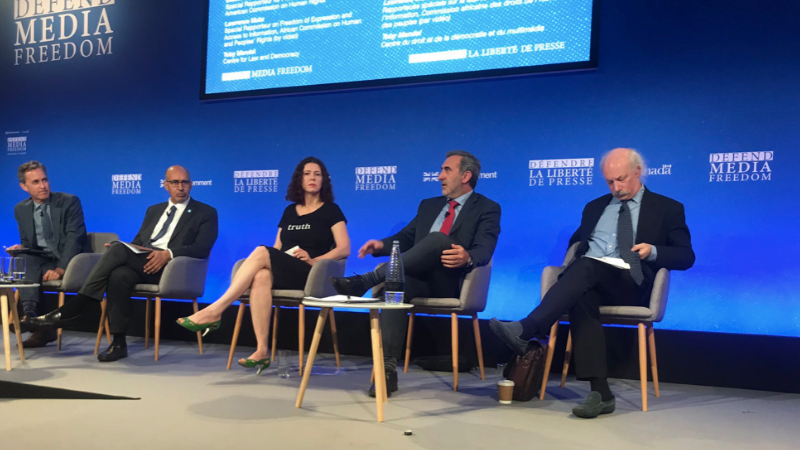The Media Freedom Rapporteurs of international institutions have come together to issue a joint declaration to voice their alarm on “the ongoing violence against and prosecution of journalists, right to information activists, human rights defenders, and others for exercising their right to freedom of expression”.
The United Nations (UN), the Organisation for Security and Co-operation in Europe (OSCE), the Organisation of American States (OAS) and the African Commission on Human and Peoples’ Rights (ACHPR) launched the 20th anniversary Joint Declaration ‘Challenges to Freedom of Expression in the Next Decade’ at the Global Conference for Media Freedom Conference in London today.
The issues raised in the declaration were developed with the assistance of international organisations Article 19, Global Campaign for Free Expression, and the Centre for Law and Democracy.
Today at #DefendMediaFreedom conference in London, @OSCE_RFoM @EdisonLanza @davidakaye launch the annual Joint Declaration on Freedom of Expression. One of the first challenges discussed — how do we create an enabling environment for free speech? https://t.co/42xq6KRtjI…
— ARTICLE 19 Law (@article19law) July 10, 2019
The aim of the declaration is to provide guidance and “authoritative standards” to governments, civil society, legal professionals and the media, on matters relating to media freedom.
The Declaration acknowledged that due to digital technologies, there is a need to address “disinformation, incitement to hatred, discrimination and violence”, among others. They organisations also expressed their concern around the “deepening threat” to independent media and media diversity that significantly undermines investigative journalism.
Other highlighted issues include the increased concentration of media ownership, political control over media outlets and “ongoing attempts to exert control over the private media”. The right to access information held by public authorities was also listed as a matter of importance.
As well as concerns raised, the Declaration lists three points designed to increase freedom of expression and media freedom over the next 10 years.
https://twitter.com/davidakaye/status/1148526503220711424
The first point relates to creating an environment that enables the exercise of freedom of expression and includes requiring governments to “take immediate and meaningful action to protect the safety of journalists…and to end impunity for such attacks”.
The Declaration also referred to the economic challenges faced by independent journalists and media outlets. The organisations raised the need for support to “mitigate the negative impacts caused by the dominance of online advertising companies”.
The need for legal and regulatory protection for freedom of expression and the promotion of independent, diverse and critical media outlets was also listed.
The second point in the Declaration relates to ‘building and maintaining a free, open, and inclusive internet”. It notes the right to using the internet as an “essential condition for the exercise of the right to freedom of expression.” I
The third point deals with ‘private control as a threat to freedom of expression”. This includes rules and measures to deal with the “undue concentration of ownership and practices” as well as greater transparency from social media giants to ensure the retention of users’ human rights.
ARTICLE 19 called on governments to pay close attention to the concerns identified within the Declaration, and to “commit to addressing them at domestic, regional and international levels”.












